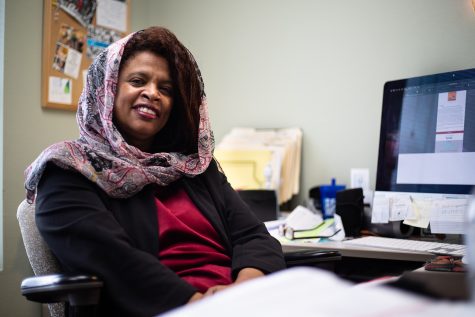Mazahir Salih: “I want to work on all the issues”
October 19, 2021
Mazahir Salih, mayor pro tem of Iowa City, said racial injustice always concerned her not just as a Black community leader, but also as a Black woman. For others, she said, it took the death of George Floyd for them to realize the gravity of the situation.
“I think it’s sad to wait until someone is dying so it will be eye-opening for those who aren’t seeing the issue,” she said. “You know, that’s not OK, but that’s the reality.”
2020 was a hard year, she said, especially for herself and Iowa City Mayor Bruce Teague.
“The mayor and I — the Black individuals on the council — we were grieving during that time,” she said. “But at the same time, we are the policymakers. It would be like, ‘Should we lead the movement, or sit down and make all the policies?’ And sometimes it is tough for us.”
She added that she was glad the council and community were able to come together to create the 17-point resolution.
“That’s not enough to do, but it’s the beginning of a lot of work that needs to be done in Iowa City,” Salih said.

But not all share her same sentiment she said. During council meetings, Salih often spoke up in opposition of her white colleagues’ opinions, and she said many issues are “still looked at through the eyes of white people.”
“Sometimes, as a person of color, I am telling you, ‘This is not the way you do it, this is not the way that is going to make me comfortable,’” she said. “You are solving Black Lives Matter issues, and as a Black woman, you are going to keep telling me, ‘no.’”
She said a phrase that comes from Sudanese culture, “You can’t handle fire the way you handle water,” represents the way white people cannot singlehandedly address the issues people of color people go through.
She said in her three years on the council, she has not seen as many people of color coming to support Black Lives Matter issues as she did during summer 2020. That helped her promote her agenda that she’s had from day one, she said.
Salih advocated for affordable housing for underrepresented individuals and discussing police interaction with Black people well before the 2020 protests, she said. Serving also as the director of the Center for Worker Justice, she talks to many individuals who come to her office to share their stories.
Salih is not seeking another term on the council in the 2021 November election in order to work full time as the executive director of the Center for Worker Justice.
“Every day, I sit down here in this office and cry with people who are really affected by it,” she said. “I see the issues and I know the issues very well. That’s why it’s very dear to my heart.”
Timeline by Molly Milder/The Daily Iowan